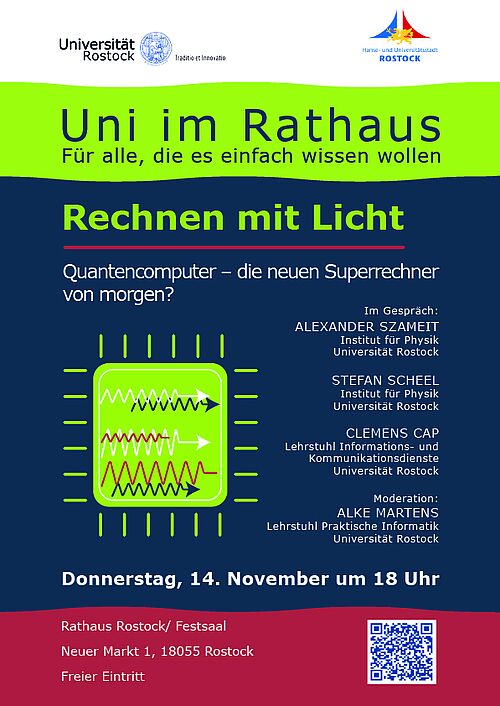Our modern world thrives on data: satellites orbit the earth; they provide valuable information about the weather (and storms), earthquakes and solar storms, allowing us to make statements about the development of the climate. Traffic flows of aeroplanes, ships and vehicles have to be coordinated worldwide. The synthesis of highly complex chemical compounds raises hopes for new types of medicines and materials. However, when it comes to processing huge amounts of data, conventional computers are increasingly reaching the limits of their capabilities.
One possible solution that has been discussed for years is a radical rethink of the computer concept - the quantum computer. Instead of conventional bits, which are either zero or one,
quantum computers calculate with so-called quantum bits (qubits for short), which can assume the values zero and one at the same time. This enables quantum computers to calculate many times faster than conventional computers, for example to predict long-term climate change or to simulate complex chemical processes for the design of drugs.
Governments, research organisations and computer and technology companies around the world are already investing in the development of quantum computers. IT giants such as Google, IBM, Microsoft, Amazon and others have already presented prototypes that demonstrate how a quantum computer works in principle. Billion-dollar start-up companies such as IonQ, Xanadu, Pasqal and PsiQuantum hope to bring a functional quantum computer onto the market as soon as possible. The University of Rostock is also conducting research into quantum computers that work on the basis of light.
But how far has this future technology progressed to date? When will quantum computers actually calculate faster than today's computers? Who will master them? And will they ever be suitable for domestic use? - Rostock physicists Stefan Scheel and Alexander Szameit will be talking to computer scientists Clemens Cap and Alke Martens from the University of Rostock about quantum computers as possible supercomputers of the future at ‘Uni im Rathaus’ on 14 November 2024 at 6 p.m. - in a clear and generally understandable way. Anyone interested is cordially invited to join the discussion and ask questions. Admission to the event in the Festsaal of Rostock Town Hall is free.
UNI IM RATHAUS: For everyone who just wants to know! Anyone interested is cordially invited to discuss current issues in science, politics or society - with scientists and experts from the Hanseatic and university city of Rostock. Together, openly, controversially. The series of talks is organised by the Interdisciplinary Faculty at the University of Rostock together with the Hanseatic and University City of Rostock.
‘Uni in the town hall’ theme:
Computing with light. Quantum computers - the new supercomputers of tomorrow?
Date:
Thursday, 14 November 2024 at 6 pm
Venue:
Rostock Town Hall/ Festsaal, Neuer Markt 1, 18055 Rostock
In dialogue:
Prof. Dr Alexander Szameit/ Managing Director of the Institute of Physics and
Head of the ‘Experimental Solid State Optics’ working group at the Faculty of Mathematics and
Faculty of Natural Sciences at the University of Rostock
Prof. Dr Stefan Scheel, Head of the ‘Quantum Optics of Macroscopic Systems’ working group at the
Systems’ at the Institute of Physics at the Faculty of Mathematics and Natural Sciences at the
University of Rostock
Prof. Dr Clemens Cap, Chair of Information and Communication Services at the
Faculty of Computer Science and Electrical Engineering at the University of Rostock
Moderation:
Prof. Dr Alke Martens/ Chair of Practical Computer Science at the Faculty of Computer Science and
Electrical Engineering at the University of Rostock
Contact Press enquiries:
University of Rostock
Press and Communications Office
Phone: +49 381 498-1012
Fax: +49 381 498-1032
E-mail: pressestelle@uni-rostock.de
Hanseatic and University City of Rostock
Press and Information Centre
Phone: +49 381 381-1417
E-mail: presse@rostock.de
Contact for organisational questions:
Interdisciplinary Faculty of the University of Rostock
E-mail: im-rathaus@uni-rostock.de

